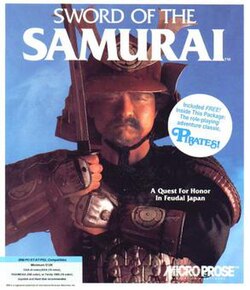Sword of the Samurai (computer game)
| Sword of the Samurai | |
|---|---|
 |
|
| Developer(s) | MPS Labs |
| Publisher(s) | MicroProse |
| Designer(s) | Lawrence Schick |
| Programmer(s) | Jim Synoski |
| Artist(s) | Barbara D. Bents, Michael O. Haire, Jackie Ross |
| Writer(s) | Jeffery L. Briggs, Sandy Petersen, Lawrence Schick |
| Composer(s) | Jeffery L. Briggs |
| Platform(s) | MS-DOS |
| Release date(s) | 1989 |
| Genre(s) | Action, strategy, role-playing |
| Mode(s) | Single-player |
Sword of the Samurai is an action and strategy video game developed and published by MicroProse in 1989 for the DOS platform. It features role-playing, strategy, and arcade elements set in feudal Japan. The player begins the game as a little-known vassal samurai; his ultimate goal is to replace Oda Nobunaga as the daimyō responsible for reunifying sengoku Japan.
Tommo Inc. purchased the rights to this game and digitally publishes it through its Retroism brand in 2015.
The game begins by giving the player their choice of name, clan, and family specialty. Within the game, death is final and frequently risked; an early priority is establishing a family, which permits the player to continue as the samurai's heir in the event of death or retirement. In the first two sections of the game, the player rises from a minor retainer to a more powerful lieutenant and then to daimyō over his entire clan. At each of these levels, he competes to curry favor from his lord with three computer-controlled rivals who also seek to become first in favor and next in succession. Each samurai has several properties, including land holdings, army size, sword-fighting ability, and generalship. In keeping with the Bushidō theme of the game, army size and honor have the greatest influence over how the samurai are ranked.
A wide array of dishonorable actions are also possible. The player (and AI controlled characters) may kidnap and rescue family members, dishonor other samurai, or even assassinate their rivals or lord. Naturally, such behavior carries serious risk. The samurai performs these acts personally and risks capture or death. At minimum, exposure entails loss of honor and land and more serious offenses require ritual suicide (seppuku); a failed attempt on the life of the samurai's lord occasions the extermination of his entire family, losing the game.
...
Wikipedia
